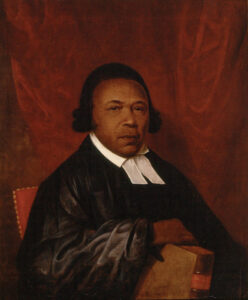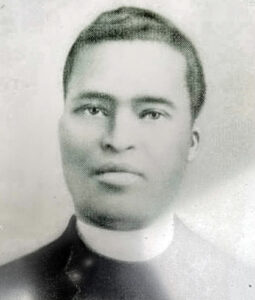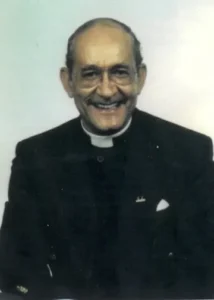Set us free
Absalom Jones, The First Black Priests, and the Courageous and Faithful White Bishops who Ordained Them
by The Rt. Rev. Dr. Dorothy Sanders Wells

February 13 is the day set aside to commemorate the life of Absalom Jones, the first black man to be ordained as a priest in The Episcopal Church in the United States. No history is contained in a vacuum—and to celebrate Absalom Jones is also to take note of the particular circumstances under which his ministry took root and grew.
Jones was born an enslaved person in Delaware in 1746. He was sold to a slaveowner in Philadelphia, near the time that Pennsylvania became a “free” state—ending the importation of enslaved persons into the state and declaring that all children born in the state were emancipated. Jones worked first to secure his wife’s freedom, and then to secure his own, all the while learning to read, write and be a contributing member of a free society.
Jones and other black worshippers had begun worshipping at St. George’s Methodist Episcopal Church in Philadelphia. He and fellow worshipper Richard Allen were worship leaders, and were reportedly the first black men to be licensed as preachers in the Methodist Church. The black worshippers at St. George’s continued to grow in number, with Jones and Allen ministering to them. On a fateful Sunday in 1791 or 1792, the black worshippers arrived at St. George’s and were asked to sit in a newly-constructed balcony (which it seems the black worshippers may have helped to fund through their offerings). The black worshippers walked out, and did not return.
Uncertain of how the worshipping community would move forward without an organized church to which to attach, Jones apparently sought out Bishop William White (1st and 4th Presiding Bishop, and Bishop of Pennsylvania). Jones had specific requests on behalf of the black worshippers: The group needed to be recognized as an organized body of worshippers and have control over its own affairs. White agreed to the requests, the worshippers voted to become part of this fledgling new American church, and the African Episcopal Church of St. Thomas was born in Philadelphia. Jones was ordained a deacon in 1795, and a priest in 1802. Under Jones’ committed and pastoral leadership, St. Thomas Church grew to more than 500 communicants in the first year.
And, more history would be made: Jones’ ministry colleague, Richard Allen, did not join the Episcopal worshippers. Allen went on to establish the African Methodist Episcopal (AME) Church, the nation’s first black Christian denomination. Allen had successfully sued for the right to establish a new Methodist denomination.
Any commemoration of the life of Absalom Jones must also recognize Bishop William White. White ordained another black priest, William Levington—and little is included in White’s biographical works about those two ordinations. One might speculate that in the early 19th century, as slavery continued on in most of the nation, White’s decision to ordain two black men was a controversial one. But White was for his time deeply involved in supporting the vulnerable in society—a supporter of education, and of the marginalized and outcast, and credited with having founded a Philadelphia ministry which helped young women begin again after leaving prostitution.
History doesn’t seem to include the reasons that Absalom Jones sought out Bishop William White. Perhaps he knew of Bishop White’s instrumental work in helping to organize the Protestant Episcopal Church in the United States—and was hopeful that this “new” church would be a welcoming place for the worshipping community gathered around him. However the Holy Spirit worked to lead Absalom Jones to The Episcopal Church—and to enable Bishop White to see Jones’ gifts—today we give thanks:
Set us free, heavenly Father, from every bond of prejudice and fear; that, honoring the steadfast courage of your servant Absalom Jones, we may show forth in our lives the reconciling love and true freedom of the children of God, which you have given us in your Son our Savior Jesus Christ; who lives and reigns with you and the Holy Spirit, one God, now and for ever. Amen.
The first black men ordained in Mississippi

There is little information about the ordination of the first black clergy in Mississippi apart from Council proceedings and bishops’ journals. Those records indicate a commitment on the part of the Diocese of Mississippi to minister to black persons before and after emancipation—with baptisms, church school attendance and worship with “colored” persons having been recorded. The first ordination of a “colored” man in Mississippi is recorded to have taken place on May 13, 1874, when George Jackson was ordained to the diaconate by our first bishop, Bishop William Mercer Green. Bishop Green, recognizing that training in residential seminaries was not an option for all persons who were called to ordained ministry, established the Bishop Green Training School and Associate Mission, near Dry Grove (Hinds County) [We note here that Mississippi continues to provide local formation for the diaconate through the A. C. Marble School, part of the Iona Collaborative, and named after our VIII Bishop, Alfred C. Marble, Jr.]. Jackson was educated there, apparently alongside white men who were also being prepared at the Bishop Green Training School. Jackson’s ordination is believed to be one of the first—if not the first—ordination of a black man to take place in the South. From the few available records concerning Jackson, it appears that his diaconal ministry ended in 1878.
The first three bishops of Mississippi all ordained black men: The first black man to be ordained a priest in Mississippi is recorded to have been Richard Temple Middleton, who was ordained a deacon in 1900 by our second bishop, the Rt. Rev. Hugh Miller Thompson, and was ordained a priest in 1903 by our third bishop, the Rt. Rev. Theodore DuBose Bratton. Richard Temple Middleton would go on to become the first black priest to serve St. Mark’s Church (Jackson), where he began serving in 1904.

Richard Temple Middleton’s father, George Gilbert Middleton, was also a priest, but not ordained to the priesthood in Mississippi: George Middleton had been ordained to the diaconate in 1887 by Bishop William Forbes Adams “for Mississippi” (Adams, who had previously served both at St. Paul’s, Woodville and Church of the Holy Trinity, Vicksburg after retiring as the first missionary bishop for Arizona and New Mexico, ordained George Middleton on behalf of Bishop Thompson, who had fallen ill on the scheduled ordination date. Adams was later elected bishop of Easton (Maryland)). George Gilbert Middleton was ordained a priest in 1896 by Bishop Charles Reuben Hale, Bishop Coadjutor for the Diocese of Springfield, Illinois. After his return to Mississippi, Middleton assumed the role of Assistant to the Rector of Trinity Church, Natchez “for work among the colored people.” [Two more Middletons would be ordained to the priesthood in Mississippi: Richard Temple Middleton, II (ordained to the diaconate in June 1938 and to the priesthood in July 1939, by Bishop William Mercer Green—grandson of our first Bishop.), and Richard Temple Middleton, III (ordained to the diaconate in July 1993 by Bishop Duncan Gray, Jr. and ordained to the priesthood in February 1994 by Bishop A.C. Marble.).]
Other early black priests in the Episcopal Diocese of Mississippi included C.M. Ellingham, Albert A. Roberts and Henry S. Hartley—all three welcomed during Bishop Thompson’s episcopacy. Diocesan records indicate that Ellingham came to Mississippi from the Diocese of Chicago to serve St. Mary’s Church, Vicksburg. Roberts reportedly came to Mississippi from the Diocese of Western New York, and began serving St. Mary’s, Vicksburg after Ellingham departed for Missouri. Hartley is said to have come from the Diocese of Louisiana and began serving St. Mary’s, Vicksburg after Roberts departed for Tennessee. Black worshipping communities including St. Mark’s, Jackson (org. 1883), St. Mary’s, Vicksburg (org. 1885), Church of the Redeemer, Greenville (org. 1913), and St. Christopher’s, Jackson (org. 1966), all continue to serve our communities today.
For the wealth of diversity in our diocese today, and the ways that we all serve the world in Christ’s name, we give thanks:
O God, you made us in your own image and redeemed us through Jesus your Son: Look with compassion on the whole human family; take away the arrogance and hatred which infect our hearts; break down the walls that separate us; unite us in bonds of love; and work through our struggle and confusion to accomplish your purposes on earth; that, in your good time, all nations and races may serve you in harmony around your heavenly throne; through Jesus Christ our Lord. Amen.